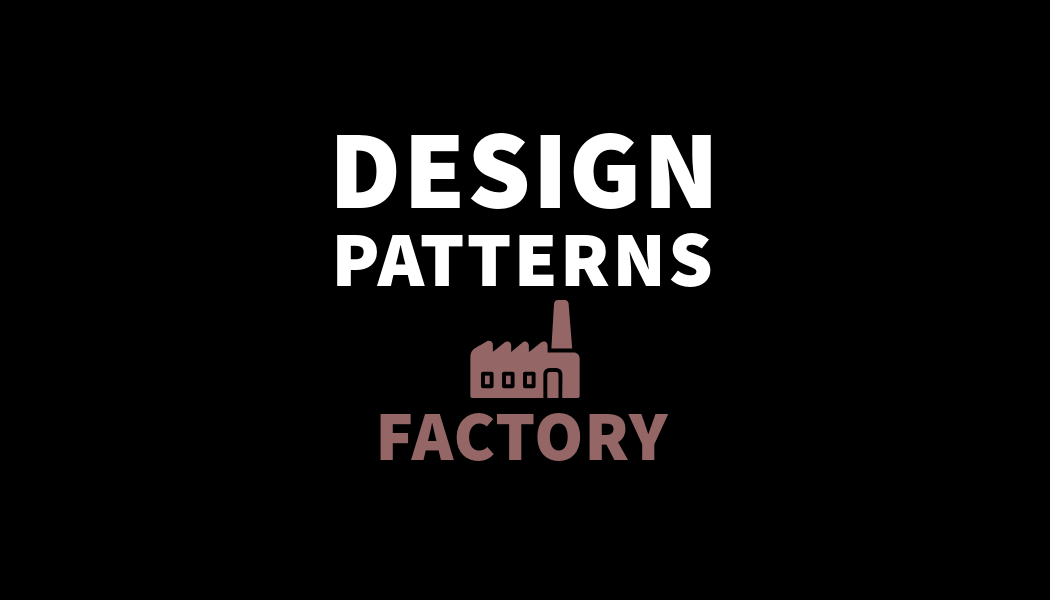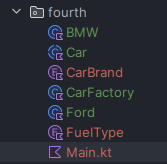Design patterns: Factory

Factory is one of creational design patterns. Main concept of this pattern is to facilitate process of creating objects and to delegate responsibility for it to special classes. With usage of Factory there is no need to directly write code responsible for creating them every time.
Problem
Imagine, that you own a car factory. Your factory specializes in producing cars from two specific brands: Ford and BMW. Each car produced by the factory is distinguished by key attributes such as engine capacity, fuel type and year of production. Challenge appear when you need to manage production of these cars in a scalable and efficient way. The factory must be able to produce cars based on the brand and ensure that the correct attributes (engine capacity, fuel type, year of production) are assigned to each car. Factory pattern can help by providing certain mechanism for creating cars. It will be responsible for instantiating cars based on the requested brand, ensuring, that all required attributes are correctly assigned and simplifying the process of car production. It also allows you to easy extensions when new car brands are introduced in the future.
Factory Method implementation (Kotlin)
Project structure

Car.kt
abstract class Car(engineCapacity: Double, fuelType: FuelType, productionYear: Int)
Ford.kt
class Ford(engineCapacity: Double,
fuelType: FuelType,
productionYear: Int
) : Car(engineCapacity, fuelType, productionYear)
BMW.kt
class BMW(engineCapacity: Double,
fuelType: FuelType,
productionYear: Int
) : Car(engineCapacity, fuelType, productionYear)
FuelType.kt
enum class FuelType {
PETROL, DIESEL
}
CarBrand.kt
enum class CarBrand {
FORD, BMW
}
Factory.kt
abstract class Factory {
abstract fun createCar(carBrand: CarBrand): Car
}
CarFactory.kt
class CarFactory : Factory() {
override fun createCar(carBrand: CarBrand): Car {
return when (carBrand) {
CarBrand.BMW -> BMW(3.0, FuelType.DIESEL, 2009)
CarBrand.FORD -> Ford(2.0, FuelType.PETROL, 2007)
}
}
}
Main.kt
fun main() {
val fordFactory = FordFactory()
val bmwFactory = BMWFactory()
val bmw: Car = bmwFactory.buildBMW(BMWModel.E60)
bmw.startEngine()
val ford: Car = fordFactory.buildFord(FordModel.CMAX)
ford.startEngine()
}
Explanation
It is really simple implementation of factory method and solution of problem explained before.
You have Car abstract class, which is template for concrete car brands classes. Ford and BMW classes extends Car class. Each class receive three arguments in constructor: engine capacity, fuel type and production year. These classes allows you to create car from specific brand. Second argument, which is received by constructor is of type FuelType. It is simple enum, which define types of fuel: petrol and diesel. Second enum in our project is CarBrand. It specifies car brands, which are produced by our factory. And finally we have Factory abstract class and CarFactory class. Actually, both has one method: createCar(). Method receive value of CarBrand enum type as an argument and returns created car. CarFactory class overrides this method from Factory class and provides own implementation. Depending on entered argument, appropriate car will be created and returned.
Your implementation can be different! Treat this as a typical demonstration example.
Extended problem
Imagine, that you have two car factories. Both produce cars from two specific car brands: Ford and BMW. Attributes, which distinguishes each car are engine capacity, fuel type and year of production. Consider, that one factory produce cars to the Great Britain and countries of the former British Empire market. Second export cars to countries such as Poland, Germany, Sweden or Spain. Difference between factories is that one should produce cars with steering wheel on the left position and second on the right position.
Abstract Factory implementation (Kotlin)
Project structure

Car.kt
abstract class Car(engineCapacity: Double, fuelType: FuelType, productionYear: Int) {
abstract fun getSteeringWheelPosition(): SteeringWheelPosition
}
Ford.kt
class Ford(engineCapacity: Double,
fuelType: FuelType,
productionYear: Int,
private var steeringWheelPosition: SteeringWheelPosition
) : Car(engineCapacity, fuelType, productionYear) {
override fun getSteeringWheelPosition(): SteeringWheelPosition {
return steeringWheelPosition
}
}
FordModel.kt
enum class FordModel {
CMAX, Focus
}
BMW.kt
class BMW(engineCapacity: Double,
fuelType: FuelType,
productionYear: Int,
private var steeringWheelPosition: SteeringWheelPosition
) : Car(engineCapacity, fuelType, productionYear) {
override fun getSteeringWheelPosition(): SteeringWheelPosition {
return steeringWheelPosition
}
}
BMWModel.kt
enum class BMWModel {
X5, E60
}
FuelType.kt
enum class FuelType {
PETROL, DIESEL
}
SteeringWheelPosition.kt
enum class SteeringWheelPosition {
LEFT, RIGHT
}
Factory.kt
interface Factory {
fun buildBMW(bmwModel: BMWModel): Car
fun buildFord(fordModel: FordModel): Car
}
CommonwealthFactory.kt
class CommonwealthFactory : Factory {
override fun buildBMW(bmwModel: BMWModel): Car {
when (bmwModel) {
BMWModel.X5 -> {
val bmw = BMW(3.0, FuelType.DIESEL, 2009, SteeringWheelPosition.LEFT)
return bmw
}
BMWModel.E60 -> {
val bmw = BMW(2.0, FuelType.PETROL, 2007, SteeringWheelPosition.LEFT)
return bmw
}
}
}
override fun buildFord(fordModel: FordModel): Car {
when (fordModel) {
FordModel.CMAX -> {
val ford = Ford(2.0, FuelType.DIESEL, 2005, SteeringWheelPosition.LEFT)
return ford
}
FordModel.Focus -> {
val ford = Ford(2.0, FuelType.PETROL, 2007, SteeringWheelPosition.LEFT)
return ford
}
}
}
}
ContinentalFactory.kt
class ContinentalFactory : Factory {
override fun buildBMW(bmwModel: BMWModel): Car {
when (bmwModel) {
BMWModel.X5 -> {
val bmw = BMW(3.0, FuelType.DIESEL, 2009, SteeringWheelPosition.RIGHT)
return bmw
}
BMWModel.E60 -> {
val bmw = BMW(2.0, FuelType.PETROL, 2007, SteeringWheelPosition.RIGHT)
return bmw
}
}
}
override fun buildFord(fordModel: FordModel): Car {
when (fordModel) {
FordModel.CMAX -> {
val ford = Ford(2.0, FuelType.DIESEL, 2005, SteeringWheelPosition.RIGHT)
return ford
}
FordModel.Focus -> {
val ford = Ford(2.0, FuelType.PETROL, 2007, SteeringWheelPosition.RIGHT)
return ford
}
}
}
}
Main.kt
fun main() {
val commonwealthFactory: Factory = CommonwealthFactory()
val continentalFactory: Factory = ContinentalFactory()
val bmw: Car = commonwealthFactory.buildBMW(BMWModel.E60)
println(bmw.getSteeringWheelPosition())
val ford1: Car = continentalFactory.buildFord(FordModel.CMAX)
println(ford1.getSteeringWheelPosition())
val ford2: Car = commonwealthFactory.buildFord(FordModel.Focus)
println(ford2.getSteeringWheelPosition())
}
Output

Explanation
This approach (Abstract Factory) is an interface or abstract class responsible for creating families of related objects. Implementation is more complex than in Factory Method case.
In this solution you have Car abstract class, which is template for concrete car brands classes. Ford and BMW classes extends Car class. Car class receive three arguments in constructor: engine capacity, fuel type and production year. BMW and Ford classes receive one additional argument, which is steering wheel position. These classes allows you to create car from specific brand and with proper steering wheel position. Second argument, which is received by constructor is of type FuelType. It is simple enum, which define types of fuel: petrol and diesel. In our our project we have also FordModel, BMWModel and SteeringWheelPosition enums. First two specifies models from car brand, which factories can produce. SteeringWheelPosition as you can guess is responsible for setting proper steering wheel position. And finally we have Factory interface, which is implemented by CommonwealthFactory and ContinentalFactory classes. It means, that both implements two methods: buildBMW() and buildFord(). As an argument proper model from specific brand is entered. Depending on entered argument, appropriate car model will be created and returned. Notice, that CommonwealthFactory creates cars with steering wheel on the left and cars from ContinentalFactory has steering wheel on the right.
Your implementation can be different! Treat this as a typical demonstration example.
Pros and Cons
✅ No need to directly write code responsible for creating objects every time.
✅ Compliant with Open/Closed Principle (SOLID). You can add new types of creating things without modifying the existing code.
❌ Code can become complicated, because to implement this pattern you have to create many additional classes.
❌ Redundant use of factories in simple projects may be expensive.